This article is part of our collaboration with International Policy Review at IE University. You can read more from the partnership at the link just above.

Credit: Federal Voting Assistance Program
By Ariana Elle Majlessi. Edited by Andrea Maria Sanchez Deras.
In the most powerful country in the world, one’s political party represents one’s value system, beliefs, and morals—the illusion of which has made US citizens susceptible to the false notion of choice inherent in the two-party system. The narrative propagated by the two-party system offers two confining alternatives or choices—or the illusory idea of such—and paints third parties as obsolete.
With the American Circus that is referred to as the “arcana of the electoral college”, the flawed misconception of the morality and modernity promoted by the Democratic Party is indisputable. This converses with the traditionalism of the Republican party which has contributed to the “frightful despotism” that is the United States presidential race.
The opposing values of these two feuding parties have come to clash over the last decade, particularly with the election of former President Donald Trump in 2016, and the subsequent January 6 attack on the Washington Capitol in 2021. This was encouraged by the latter after his loss to Biden. This calls into question why US voters should respect the American electoral system, when its electees, such as Donald Trump, the now 47th President of the United States, blatantly defy it.
US politics, rather than now focusing on the common good of the American people, focus on attacking and discrediting the opposing political party by labeling the opposition as “immoral, dishonest, [and] close-minded.” Studies show that resentment between the two parties has grown, simultaneously contributing to and drawing from already polarized power politics.
One’s political affiliation is now a defining label that is praised or judged depending on one’s stance within the chaotic stage of the American political sphere. In 2024, it was found that over 72% of self-identified Republicans argued that Democrats carry “immoral” values, while conversely, 63% of Democrats believed the same about the former. Among other defining adjectives and insolent rhetoric used to describe the opposing party on both sides were “lazy” and “dishonest.”
This “partisan hostility” is the crux of what is wrong with the American political system, whose governing elites, rather than uniting, draw on the divisions between the American people. Cooperation between the two parties almost seems like a distant dream, as perceived differences between the Republican and Democratic parties and their political members grow – which both parties foster rather than discourage. This notion of “tribalism” has eroded the integrity of the self-established propagator of democracy and peace, the world’s superpower, and leader of Western hegemony which is the United States of America.
The illusory notion of the two-party system, rather than uniting towards a common good, has created tense and fundamental ideological conflict among Americans. This has culminated in the divergence and difference that divides the American people and obstructs the possibility of palpable progress. This has essentially made the two-party system a function where “the name of [one’s] party is a distinction without difference.”
The rigidity of the two-party system moreover contributes to the propagation of specific and detrimental narratives and assumptions. What once was a relationship of mutual respect and understanding between Republicans and Democrats has turned into violent and hate-fueled debate and rhetoric that only amplifies pre-existing divisions.
Donald Trump, the President-elect, has been criticized for his record of thirty-four felony charges, implementation of the Muslim Ban, encouragement of the January 6 storming of the capital, blatant bullying, mishandling of the Russia-Ukraine War and COVID-19, and withdrawal from the JCPOA Iran Deal among many other transgressions.
Conversely, former Democratic candidate Kamala Harris’s ignorant mishandling of the humanitarian crisis and genocide in Gaza, and unwillingness to deplete funding to the Israeli state, leaves both candidates with much to be desired for American voters who went to the polls last November. Both candidates unceremoniously, and ubiquitously unite in their insulting of one another, in light of Trump’s reference to his competitor as “stupid,” while Harris referred to her Republic counterpart as “unstable.”
The blatant insulting and aggressive rhetoric perpetuated by both parties and their leaders has otherwise detracted from the so-called legitimacy, prestige, and repute of the United States of America – a nation once arguably representative of the hopeful American Dream.
In a symbol of hope, recent surveys show that 39% of Americans advocate for a multi-party electoral system – most identifying as independent rather than aligning with the Republican or Democratic parties.
As the future of American democracy and politics are at stake, it becomes imperative for Americans to question their views, values, and “biases” as American power politics continue to evolve – likely for the worse. Americans as such must reassemble and work towards common good and common ground, rather than focus on what divides them, to ensure the protection of their rights.
Such growing political divisions among the political elite in the most powerful country in the world, whose democracy was once the most respected, contribute to polarized politics and conflict which isolate the American people. This prevents collaboration and cooperation between the two parties, who could jointly drive change rather than obstruct it.
Yet, as political change goes, the important decisions are made by those in power – a reality which approaches with Trump’s inauguration into office in 2025. Whether illusory or not, it remains imperative that the American people be the voice of change and reason, and vote for the candidate who will work towards the common good of U.S. citizens. It is in essence crucial for the American people to understand that who they vote for goes beyond the fate of Americans, and will irreversibly impact the world at present and in the future.
Other posts that may interest you:
Discover more from The Sundial Press
Subscribe to get the latest posts sent to your email.





